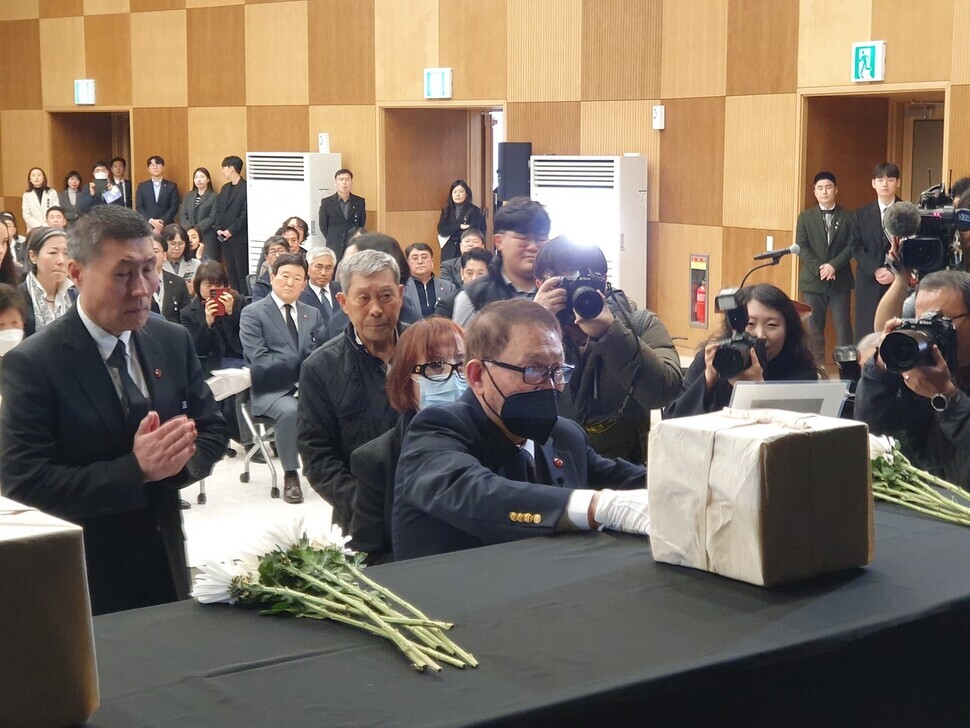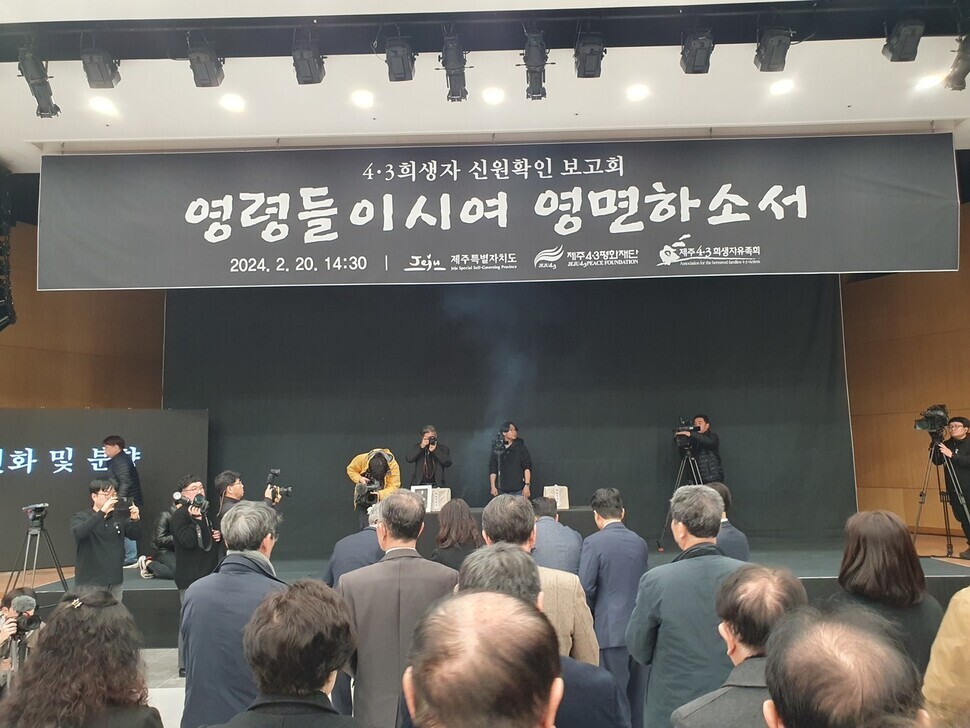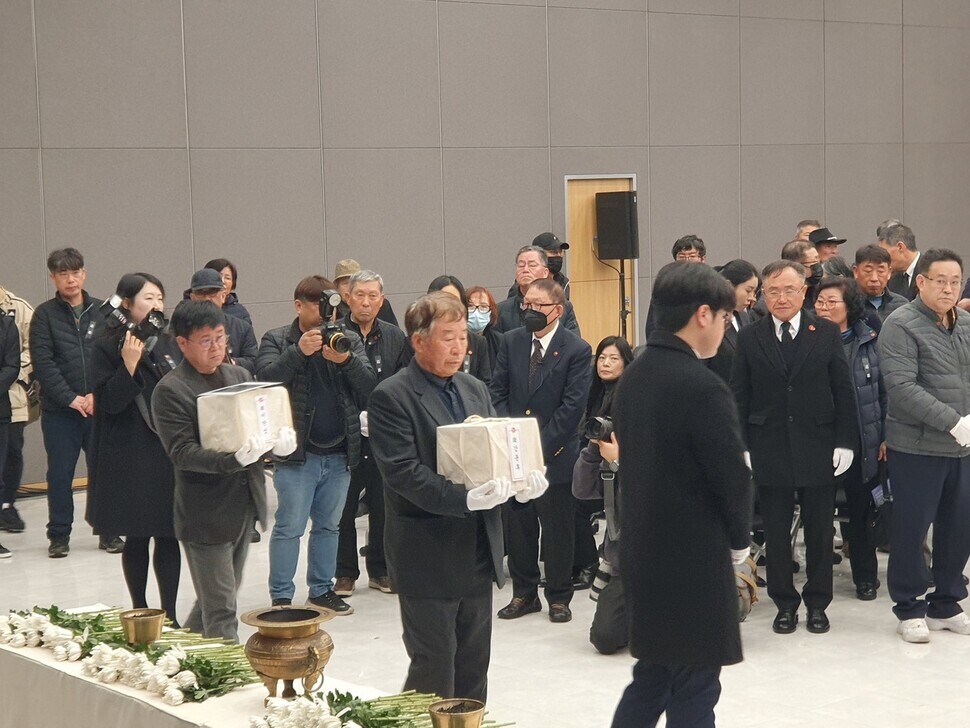
Lee Han-jin’s long journey home ended on Tuesday afternoon, as rain pattered down on Jeju Island.
The 85-year-old Korean American man worked through a jumble of unspeakable memories throughout the long flight from New York to Incheon, and then a second flight from Gimpo to Jeju. But he felt more regret than excitement at the prospect of being reunited with his brother after 75 years apart. In the falling rain, the aging man couldn’t hold back the tears dripping down behind his glasses.
Han-jin attended an event Tuesday afternoon organized by the Jeju Island government and the Jeju 4.3 Peace Foundation to confirm the identities of victims of the Jeju April 3 Incident. He was accompanied by his wife, son, daughter and granddaughter, whom he had brought on that long journey to meet his brother. Their remains had been identified after being dug up at Jeju International Airport more than a decade ago.
Lee Han-jin was born in Beollang Village, in the Hwabok No. 1 area of Jeju City. The Lee family was fairly prosperous as they had been running merchant vessels since Han-jin’s grandfather’s time.
Following Korea’s liberation from Japanese rule, the family’s eldest son, Han-bin, who had been operating merchant ships in Japan, and their second son, Han-seong, who had been living in Manchuria, returned home.
Han-jin’s father died before the Jeju April 3 Incident, and he was living with his mother and five siblings: Han-bin and Han-seong, as well as two older sisters and a younger sister. Over the course of the incident, his mother and the second daughter were both killed, and his two brothers went missing. In short, the family was almost wiped out.
Han-jin shared his memories of his brothers during Tuesday’s ceremony. Han-seong, the second son, would gather the young people of the village together in the family’s big yard to teach them the national anthem. Han-jin himself said that as a child it was exciting to sing the anthem with his brother.
A rally held on Jeju Island on the anniversary of the March 1 Movement in 1947 set in motion events that culminated in the bloody Jeju April 3 Incident. Han-seong and some other young people in the village were present at the March 1 rally.
“I remember Han-seong and other young folks in the village going to the March 1 Movement rally at Gwandeok Hall. They’d made bamboo banners and wore headbands on which they’d drawn the Korean flag. That’s the only thing my brother did,” Han-jin said.
After that, Han-jin began to attract the attention of the police and the Northwest Youth Association, a right-wing paramilitary group that committed atrocities on the island during the incident.

It was the next year, in 1948, that the Jeju April 3 Incident began. One cold winter morning that year, Han-jin’s mother and her two youngest daughters were eating breakfast in their home when a neighborhood woman urgently called his mother’s name.
Han-seong had narrowly escaped from a seaside slaughter of neighborhood youths and was hiding in one of the houses. While he’d been fortunate enough to dodge the bullets, from that point forward he was relentlessly targeted by the Northwest Youth Association.
For a while, Han-jin’s mother had to hide her other children in a neighboring village in the daytime to avoid the prying eyes of the Northwest Youth Association and then return home at nighttime. With the help of her deceased husband’s sister, she purchased 10 pairs of shoes and donated them to the Samyang Police Station nearby.
Things stayed quiet for a few days, but then more thugs began coming around. This time, Han-jin’s mother had to put her fields up as collateral. That calmed things down for a while, but soon enough more members of the Northwest Youth Association began to harass them.
With no money or fields left, Hanjin’s mother and other family members had to roam the fields until nighttime. But when they returned, their house was a pile of ashes.
After the family moved in with Han-jin’s maternal grandmother, the police began taking his mother and the second daughter to the Samyang station every morning, and they wouldn’t come home until the evening.
One day, while a snowstorm raged, Han-jin’s mother and sister didn’t return home at all. The next morning, their bloody bodies, covered with straw stacks, appeared in a wagon pulled by an uncle on his mother’s side. His sister wasn’t quite dead and managed to drink a little water before giving up the ghost. The two were buried side by side.
Han-jin’s grandmother ignored his fervent pleas to see his mother’s face just once before she was interred. She didn’t want him to see the horrific state of his mother’s body.
Han-bin, the oldest son, turned himself into the authorities in the spring of 1949 after seeing pamphlets promising amnesty for anyone who did so. Rumor had it that he was being held at the Jeju Distillery.
Han-jin lingered around the distillery, hoping to get a chance to see his brother. But then he heard a rumor that his other older brother, Han-seong, was confined in another concentration camp (on the current site of the government office in the Geonip neighborhood).
The second camp was near the distillery, but Han-jin never got to see either brother again.

Han-seong had turned himself into the police in June of 1949 after being lured by the promise that the lives of those who confessed would be spared. On June 28, he was handed a death sentence by court-martial. On Oct. 2 of that year, he faced the firing squad at what was the Jeju Airfield, and is now the site of the Jeju International Airport. In the 24 hours that made up that day, 249 individuals were executed with the approval of President Syngman Rhee.
Han-bin was given a 15-year sentence by court-martial on July 2 of that year. He spent time behind bars at Daegu Prison and Busan Prison until the outbreak of the Korean War, after which point he became unaccounted for.
“I always thought of my brother Han-seong. He never left my mind,” Han-jin said.
Both of Han-jin’s older brothers were posthumously acquitted in retrials for those persecuted this bloody era on Jeju, with Han-bin being acquitted on March 16, 2021, and Han-seong being declared not guilty on Sept. 26, 2023.
Then, the miraculous happened. While in Jeju last October to attend the second annual Global Jejuin Festival alongside some 20 other Jeju natives living in New York in his capacity as the president of the Jejudo Association of America, Han-jin had a blood sample taken for DNA testing, hoping to find his brothers.
His DNA came back as a match with remains that had been recovered. When he received the news from the Jeju 4.3 Peace Foundation on Jan. 8 that they’d identified the remains of his brother, Han-jin said he couldn’t sleep.
The other remains that were laid to rest after being identified that day belonged to Kang Mun-hu, who was killed at the age of 39. The deceased’s son, Kang Gi-su, 78, said, “My father was killed when I was 3. As a child, I always wondered to myself why my father wasn’t there. Only as I grew older did I learn that my father had died in the Jeju April 3 Incident. When I learned on [Jan.] 7 that his remains had been identified, I was shocked.”
Kang fell to his knees in a bow to those present at the meeting.
Both sets of remains identified that day were laid to rest in the mausoleum where the ashes of those killed in the Jeju April 3 Incident are enshrined at the Jeju 4.3 Peace Park.
By Heo Ho-joon, Jeju correspondent
Please direct questions or comments to [[email protected]]
